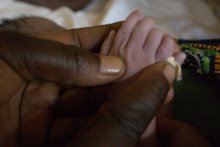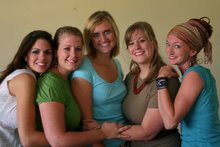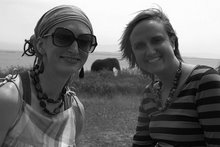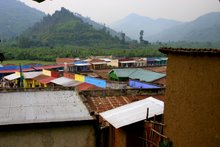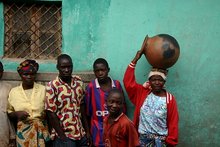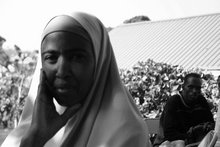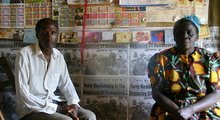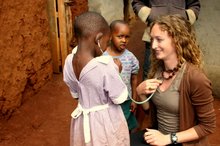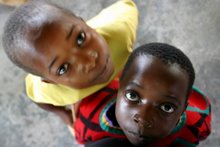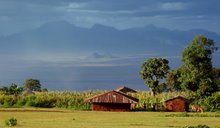Friday, June 29, 2007
Welcome to Shyira Operating Room!!
After lunch I got to see my first C-section. The P1G0 21 yo woman had been given oxytocin to initiate contractions at 9 am. At 1pm, her cervix was still only 3 cm dialated. Because of her active phase arrest, Dr. Kohl did a low segment transverse C-section. I got to be his first assist and close the incisions. It was quite an experience: In his German accent Dr. Kohl explained everything. "Dis is ze sfubcutaneouz fatz," he pointed out as he dug his hands in and ripped it from the fascia. He looked at me and said, "Now youtz. Rrrrip. Watchz carefully: you dzo ze next one." There was blood everywhere, a blue baby screaming, bloody rags being pulled from her peritoneum, and latrine smells wafting in. She had to recieve a transfusion because of the blood loss. I was stunned. I loved it.
An ambulance brought in the next patient. She looked to be at term and was seizing. Her BP was 160/90. The fetal HB could not be found with a fetoscope (old school here) or a doppler. They gave her MgSO4 and brought her into the OR. Three assistants held her down and monitored her BP and O2 saturation. She was unconscious so she was just given a local anethestic and a classical incision was done. I carried the blue baby to her chitange. While Dr. Kohl and I did the matress stitches, I wondered what she would think when she regained consciousness.
International Medicine at Shyira Hospital

I am working at Shyira hospital in the rural mountains of the north. When I arrived, I met the German OB doctor whose wife had been my contact through e-mail. The first thing he said was, "Good. I hear you are fluent in French." The national language is French, and all the hospital charts are in French. The people speak Kinyarwanda. The doctor I am working with is German. The culture is uniquely Rwandan. The pharmacy formulary is British. C'est facile, non?
Now I am working on a staff of two Rwandan doctors, two Congolese, one German, and two Americans on the way. My days include rounds in the maternity ward, pelvic exams, rounds in the internal medicine ward, visiting the lab to see stool samples infected with parasites, ect. And I've added French lessons at night to help with my "fluency" from high school classes.
More on Shyira's website: www.shyira.org
Rwanda in BRIEF
Almost one million. Hard to comprehend? Annie Dillard puts it in perspective: Just imagine yourself, in all your uniqueness, individuality and passion, and multiply it by 800,000. Easy, huh?
Rwanda now struggles to overcome the genocide. Memorials are throughout the countryside: Churches with bullet-holes preserve the stories of mass killings that happened in places people gathered for safety. People throughout the misty hills suffer with nightmares. From where I sit and type I can see soldiers posted to march around this area and make their presence known to the Interhamwe that hides in the Congo and hopes to return.
Gachachas are haphazard courts in an attempt for justice from a time when neighbor killed neighbor. Yesterday one met outside of the Shyira primary school. It's one's word against another, and with the Rwandese's history of mistrust it breeds paranoia. One member of the church has gone missing. People say he's innocent, but people also say his brother is innocent and he has been imprisoned for 13 years because of someone's accusation. He is fearing the same.
There is hope for the Rwandans. Progress is also visible in this country. Despite the corruption of many East African countries, Rwanda's government is very active and not corrupt.
Many NGO's have a strong presence in the country. In Rwanda, one day a month is 'community day' for projects. There is no trash and no street food. In the capital city of Kigali flip flops, spitting, and bota bikes are outlawed. It almost doesn't feel like Africa seeing a goverment so involved. I can tell it will be a pleasure to live in this unique place.
Left over Case from Uganda: Peptic Ulcer Disease
We got a call that Grace was in the hospital. She had suffered from ulcers and GERD in the past. Ellen tried to keep her supplied with proton pump inhibitors, but for Africans it's not an easy concept to take medicine even when you don't feel bad, so it had been a while since she'd taken the medicine. She was low on money, so she wasn't eating. This exacerbated the ulcers, and she ended up in the hospital. When I visited they had done tests to rule out malaria, typhoid, and HIV--common causes in Africa for general malaise and vomiting. She was recieving a PPI, Cipro, and worm treatment. Her nail beds were extremely pale, so I asked about her getting iron. They said, "It's not so bad," as they pointed to her hemoglobin result of eight. She was in extreme pain, but it seemed to be somatic. Perietal signs were negative with no guarding or tenderness to palpation. Psoas and obturator signs were negative.
The ultrasound showed a normal liver, spleen, and bladder, but they had reported fibroids in the uterus. She seemed to be having an extreme exacerbation of her peptic ulcers most likely with blood loss that caused her anemia and fatigue. However, all that was reported to her was this foreign word: fibroids. We got to explain to her that they were very common in women (even more so in black women) and they were not the cause of her pain. She is 27 and still wants to have children so it was a relief to her that she would not have to have a hysterectomy to cure this epigastic pain she was experiencing. Now Ellen is seeing that she stays well supplied on PPIs and Iron.
I included this entry for several reasons. First, to show an example of lack of resources as a cause of health problems. We can educate about eating right, but some don't have the money to do so. Second, I want to have an example of how patient education is lacking. Because they did not explain fibroids, Grace was under the impression she needed a surgery to remove her uterus. She figured that fibroids were causing her pain. She was at the mercy of the doctors but without being educated herself to realize her fibroids are a benign finding. I feel that health education is a major goal to keep the people empowered over their own health. It was a good lesson that anywhere people deserve to know about their bodies, their test results, and prevention.
Friday, June 22, 2007
ode to Kampala



i'm leaving the city by bus for Rwanda and my next clinical rotation. It's very hard to leave. I "feel free" in this place thanks to the community that has welcomed me. These last few days I've carried my camera around everywhere trying to steal pieces of this place. Now, I'll write in an attempt to share the life of this place with you.
The streets of Kampala are so alive: they are the climax of a live symphony. third world style. Men pushing wheel barrows brimming with colorful fruit compete with diesel trucks for space, and rivers of motorcycles flow through any room that's left on the road. The bota-bota motorcycles carry women side-saddle, little children wearing bright school uniforms, and even wooden bed frames that tower several feet above the driver's head. Horns blare and merchants approach moving vehicles in the lively chaos.
In the morning I ride a bota to the top of Nairembe hill. I can taste dust in my mouth--the same dust that coats the old buildings along the street. They look like they have risen up from being buried alive. The lines of drying clothes give the dingy buildings the color that they have lacked since the colonialists painted them years ago. From the top of the hill I hear the call to prayer from the mosque as I look out at the hills arising from the city below. Seven of the mounds are the hills of the city and the rest are stacked clouds of the morning haze filling in the valleys. Two million lives arise to collide in the small spaces of the city. I was one of them.
The nights are warm and lively. Merchants light their crowded wooden dukas with oil lanterns and candles. Away from the city the loud sound of crickets takes over the honking. From Ellen's house I can hear the brassy sound of the neighbor's radio. It's playing Ugandan hits that repeat and repeat a simple reggae beat.
I enter the Better Living Resource Center just off the main road. On the couches on the porch I am greeted by whatever regulars are around for the day. This place is home to a multi-generational group that has been a powerful example of community. Students are scattered around utilizing the library or reading the newspaper. Rebekah, who most people refer to as their "auntie", cooks lunch everyday using fresh garlic and ginger root: I'm still not tired of her beans and rice even though I eat it five days out of the week. Moses and Able live in a small closet behind the center. They talk to me about music, culture, and help out with whatever we're doing for the day. Seth is a goofy artist who loves children. His art is up around the office, and he hangs around to take me to a near-by orphanage on my day off. He has dreams to open his own. There is a group of girls in their twenties who show up for choir practice and then take me out dancing with them. They are amazing girls, and I'm so proud of how hard they work. Teddy comes from the royal family of Tutsi in Rwanda. Before the kingship was abolished her father was carried around on men's backs. Fred is an evangelist at the church. He comes with his niece Rachel who is in his care because the African concept of responsibility to family reaches beyond the immediate family, and his sister has put him in charge of one of her children. Fred knows a great deal about the cultures and history of Uganda. He has taught me a lot. A women's refugee group has meetings at the center. I will sing with them before they come to the clinic on Saturday. I have gotten to know many of them from staying in their homes, buying their jewelery, and visiting them in the hospital. They have unbelievable survivor stories and I admire them.
I could go on....Issac, Able, Josesph, Maggie, Sheba... but this may be more detail than one cares to read about. The point is that this rotation has been a treasured experience in family medicine: All my patients have become like family. I know them and their stories. Most of them I have seen many times--in and out of clinic. We play football together, I see them at church on Sunday, I eat lunch with them, dance, we practice singing together, I love their children, I admire their perseverance. It has been a joy to work at this community center.
Culture


Last week at the craft market I had a long conversation with a vendor from Ethiopia. When I mentioned I liked Ethiopian food, she invited me to her home for dinner. Ellen and Fred accompanied me. I was amazed at their hospitality and their rich culture. As the Ethiopians recount, their Queen Sheba visited King Soloman and came back to her country pregnant. The royal line in Ethiopia claims its present lineage from the descendent of Soloman. The people have a distinctive look among Africans from their Semitic heritage.
Yorda and her sisters performed a traditional Ethiopian coffee ceremony in the specific coffee ceremony dress. It is a cornerstone of the culture. Coffee was discovered in Ethiopia, and in the ancient ceremony the green beans are roasted above coals and crushed with a wooden mortar and pestle. Incense was burning but the rich smell of the fresh beans was overwhelming it. They added water to a wooden urn and then poured it into small ceramic cups. They told us that when you have your friends over for a ceremony, you keep filling the urn with water until there are no more grinds left. They were enthusiastic hosts. On the way home Ellen and I were discussing what a privilege it had been, and she said, "Imagine leaving your home from war. You're in a foreign country and culture. I think they can relate to us more than the Ugandans who feel at home here. They must appreciate an eager audience to hear about the land they are missing."
For dinner we had njera and dorowat (my favorite!). The njera is made from a type of grain indigenous only to Ethiopia. It is a foamy bread that is used like a spoon to wrap up the spicy meat and sauce. After dinner they put on Ethiopian music videos and taught Ellen and I how to do their traditional dances. The music videos were hilarious: women badly lipsinking while cutting onions and making food with interspersed clips of dancing. We were given wraps that they use during the dances. The girls were amazing: they move their shoulders up and down, back and forth so fast while their head stays perfectly still.
One Sunday night we got to see a dancing troupe. They performed dances that are each unique to a Ugandan tribe. I am in awe of all these traditions and rich culture. I watch all their dances and costumes totally amazed, and can't help but feel that in comparison my own culture seems lame.
I feel like one of my best gifts here is to complement their culture and show interest, especially since so many colonists have treated Africans as inferior in the past. On my last day, some Ugandans presented me with a musical finger harp. They said they chose it because they saw how much I loved their music and how I loved to dance. What a complement.
Friday, June 15, 2007
Lost in Translation: Ft. Portal clinics

We just finished our clinics in the Western part of Uganda near Fort Portal. The village was nestled in between bright green tea fields by the Rwenzori mountains that form a barrier from the neighboring Congo.
In a small village, a mzungu (meaning white man, literally "running around fast") clinic is kind of like a circus coming to town. Fortunately, there were less life-threatening cases here. These complaints were my favorite:
"I'm having trouble yawning"
"My legs are jiggly" (which she demonstrated)
A man walks in, sits down, and says,"My legs are paralyzed."
In this area witchcraft is more prevalent. Many time, especially at night, when someone whistles at another person they are casting a curse on them. So it was not taken well when one of the Americans, trying to get the crowds' attention, whistled loudly with her teeth in her mouth. Hahah. It definately got everyone's attention.
Gross Diseases
Many of my patients over the last few days have "worms" as their complaint. They feel itchy and attribute it to worms. Others have a sore throat and attribute it to worms crawling up. Basically my patients over the last few days have attributed almost any symptom to worms. I try to get more information on treating their symptoms because often it's from another cause. But while I'm on the subject of tropical diseases I'll write some on Ascaris, the most common parasite here. Ascaris, hookworm, is a result of infected stools making their way to water or food and are ingested by humans. When they enter the blood stream they hatch and can cause general itching. The young worms travel to the lungs and can sometimes cause cough while the worms crawls up through the windpipe, slide down into the esophagus, and feast in the intestine.
Roundworms in the intestines can cause indegestion, discomfort, and weakness from the anemia from blood-loss. On rare, but memorable, occasion the worms can come out of the stools or crawl out through the mouth or nose. One 400mg tablet of Albendazole kills the worms. These were handed out to most patients.
Case: Chronic Renal Failure
Esther was a stunning example of how kidney failure effects the whole body, and how much permenent damage can be prevented with proper treatment and dialysis. Her mother gave the history that she got sick in 2nd grade, "got puffy", and her bones became disfigured. Most likely, the infection in 2nd grade was followed by a glomerulonephritis, nephrotic syndrome, and now she has chronic renal failure. The kidney plays a role in making vitamin D to help absorb calcium. Without the kidneys she did not have bone growth, especially in the long bones. She also showed signs of anemia: pale conjunctiva and nail beds. Erythropoetin is a hormone made by the kidneys that signals growth of red blood cells; and, without the hormone her bone marrow does not produce enough red blood cells. In America, she would have been treated with vit D, erythropoetin and a kidney transplant. However, she has just recently come under the care of Ellen. With a consult from a nephrologist in the states, she gave Calcium and vit D supplements, Fe and folate supplements, and protein supplements. We sent her to a lab for an Ultrasound and a Voiding Cystourethrogram to determine the next steps.
Saturday, June 9, 2007
Village clinics in Jinja

I am writing this on the way back from our three days in the villages around Jinja doing medical clinics. I feel sympathetic to the poor
On the busiest day, in the village plagued with malaria, the three doctors and I saw almost 400 patients. This is not a bragging right. It is a horrible way to do medicine, but my only condolence is that is more than they will usually get, which is next to nothing. We treated many children with malaria; we treated pneumonia, gave iron and folate to pregnant women, as much education as possible, H2 blockers for "ulcers" (GERD), painkillers to old men stiff from years of hard work, cream for yeast infections ect.
My translator was a 19 year old girl who is in university in
As we were preparing to leave the final day, I saw a mother and her sick child. I think I gave the mother medicine for her allergic rhinitis. Her boy was less than a year old, tachypnenic, and looked like he was sleeping. She told me that he was suffering fever, blood in the stools and blood in the urine. I asked a few questions and felt over my head. I told her to wait as I asked the other doctors to take care of it. We ended up gathering some money and sending him to the hospital. The conjunctiva of his eye was white. Dr. Hall, who worked here for six years, explained to me later that this is a common presentation for dying children in the area. Children and pregnant women are already low on iron as their blood supplies are pressed to keep up the body. Meat is the main source of iron, and it is in low supply in the village. Also many take tea, which has phytates that bind iron in the intestine so it is not absorbed. Worms steal blood as they suck the intestines, and they are common in
The last we heard he'd been accepted at the hospital, recieved blood, and was beginning malaria treatments.
This is me trying to sound like an expert.... (without spellcheck)
A worker bends down under an open window. She comes up, hits her head, and exclaims, "The window hit me!". A worker pumping gasoline tries to pump to the roundest number. He is afraid to go over the amount handed to him, shrugs, and says, "It has refused". A villager is lacking a health clinic and good road. They say, "The money: it has refused us."
A Westerner would lable this "fatalism". We would put the blame on the person. "I hit my head", "I can't pump it more", "We can't get funding"....
In
Maybe I would agree until I remember the feeling of living in
So I can understand how one becomes fatalistic. Without any way to get a job one has to rely on "sponsors" from rich countries to send $100 for children's school fees. Without a reliable government one just has to learn to be complacent with no roads or clean water. Without any means of getting a "second opinion" one has to be content with medical treatment that isn't even working. While in wealthy
Other countries have recognised the poverty of
So what's the answer? I don't know. I don't think the answer is to make the whole world mzungus (white people). I believe some of the solution will involve empowerment.
I have been privaleged to hear from Dr. Mark Hall here on the medical mission. He worked for six years in Jinja, mostly doing basic health training in the villages. He recognized that building a hospital is sexy and Western, but is more like opening a candy shop in a land suffering from famine. For every life saved in a hospital, 100 people die in the villages from simple diseases. I've heard the stat that every 5 seconds a child dies in third world countries from treatable diseases. Dr. Hall recognized how many lives could be saved if the people could recognize dehydration and make Oral Rehydration Solution, if people could recognize malaria before a child is severely anemic and go for treatment, if people could understand nutrition--and all of this in a culturally appropriate and understandable way--hundreds could be saved. Prevention is about as glamourous. Neither are unknown grass-roots project with no website OR huge numbers to boast. The safari ants over here are not very glamorous either, but they drive entire households from buildings.
Saturday, June 2, 2007
Case: Long Term Effects of Polio
A 27 yo Congolese refugee and member of the church often comes to the clinic to translate for us. He uses braces and crutches to walk and wears a shoe fitted for the difference in his legs'
lengths. Today he came for himself. We were not overwhelmed with patients, so Ellen suggested I take a full history.
This man got polio at the age of six. Since then he relied on braces and corsets to get around. I had to admit that I did not know much about the pathology of polio--only that it was a routine vaccination now.
He suffers from effects of post-polio. It is really a shame to see a man in such pain from a disease that is preventable. Polio effects the upper motor neurons, and now he still has fasiculations (muscle twitching) and abnormal joints because of a mismatch in his extensors and flexor muscles with one being tightened (much like in cerebral palsy) he has joint pain. Ellen keeps him supplied with painkillers that help and we sent him for muscle relaxants.
My latest African Slumber Party
On one of my first days at the clinic I met a Rwandan refugee woman who showed me around the area. I believe that staying in someones home is the best way to really get to know a place, so I told her I wanted to come stay with her. In Africa, hospitality is great honor: families consider guests a gift from God. So, I didn't feel like I was imposing.
So last night I stayed with her and her children Dear, Lucky, Winner, and Joy. She had just been "chased" from her last house because she could not pay. I was with them on their first night in their new place. I honestly don't know how she survives. It is so hard to find work in Kampala that she is unemployed just looking for odd jobs to support her family. She is completely reliant on others' generosity for school fees for her kids and places to stay.
While we were waiting for her daughter to go get some charcoal for a fire I asked her about her home. She is Tutsi and married a Hutu man before the genocide. She could not stand the hate in Rwanda, and so after her husband disappeared she brought her family to Kampala. I love talking to her because she is able to see past the hate that many cling to after such a war. She told me that when her children ask about the war, she only tells them political reasons. She said that she will not place blame on any tribe and cause them to hold hate in their heart. She told me that we should love everyone--that tribe doesn't matter, but she explained that although she tries to love everyone she cannot trust everyone. Because her children are "mixed" (Hutu and Tutsi) she explained that many people hate them. Because she is Tutsi but married a Hutu she felt, and still feels, hate from both tribes. As she told me more about her experience in Rwanda and people who have helped her here, she continued to remind me that these are secret things. She does not even want other members of the church to know because she cannot trust them. She feels they still have resentment to her heritage.
It is such a privilege to meet people like Pascasie. Rwanda is certainly not the only place with tribal hate and prejudices. Around the world people identify with what they are familiar with and hate what they do not know, even building a hierarchy based on tribe and color. However, this beautiful lady from such a violent background realizes that hate and blame is not the answer. She chooses to love, and is raising her children to do the same.
She braided my hair for me. It took 12 hours, so we got good bonding time. I was able to pay her a good price, and I think when I leave I may try to use some of the donation money to give her another month's rent. Thanks again for the donations. Some have asked about leaving some: just see my first post.




